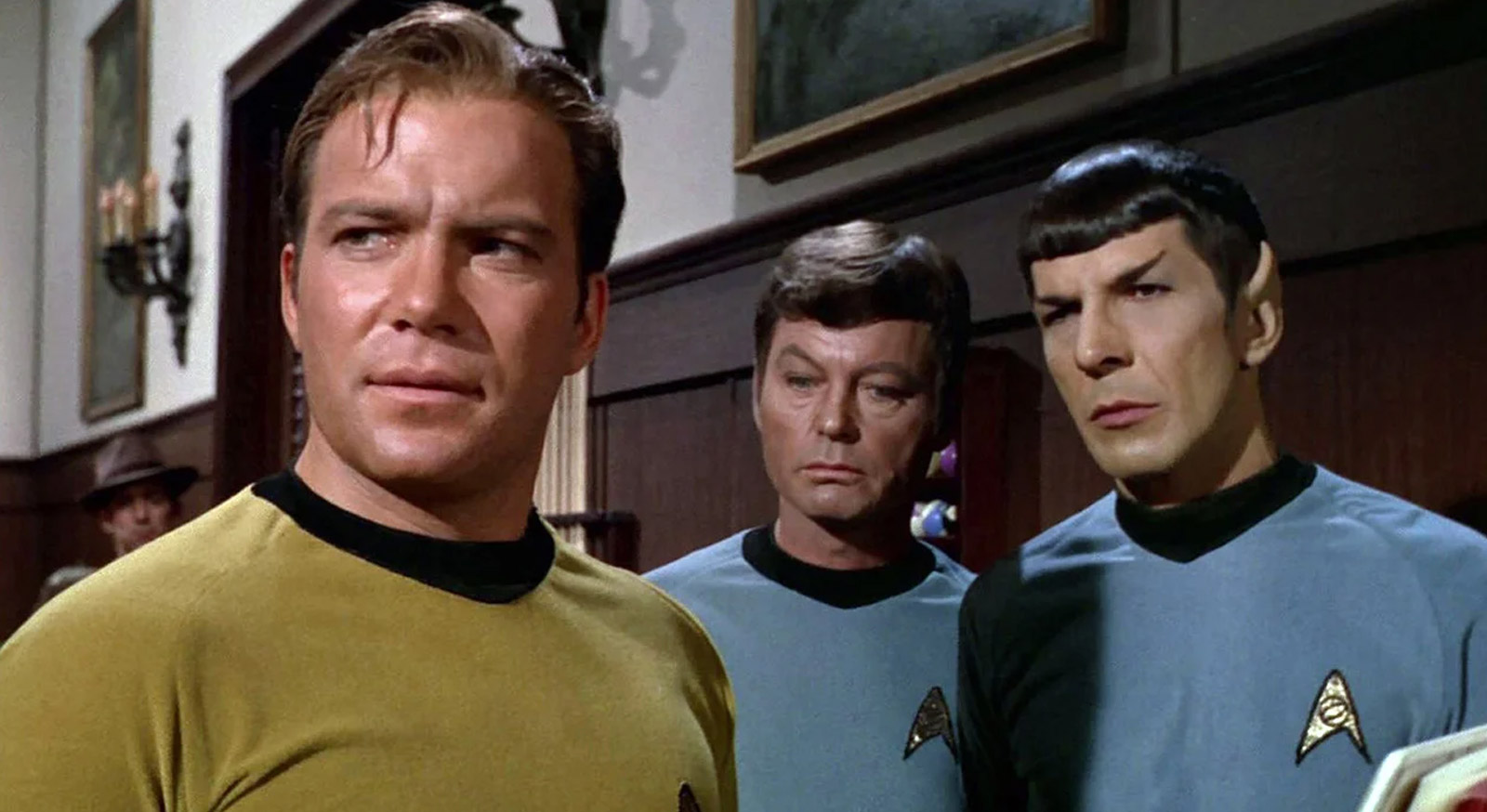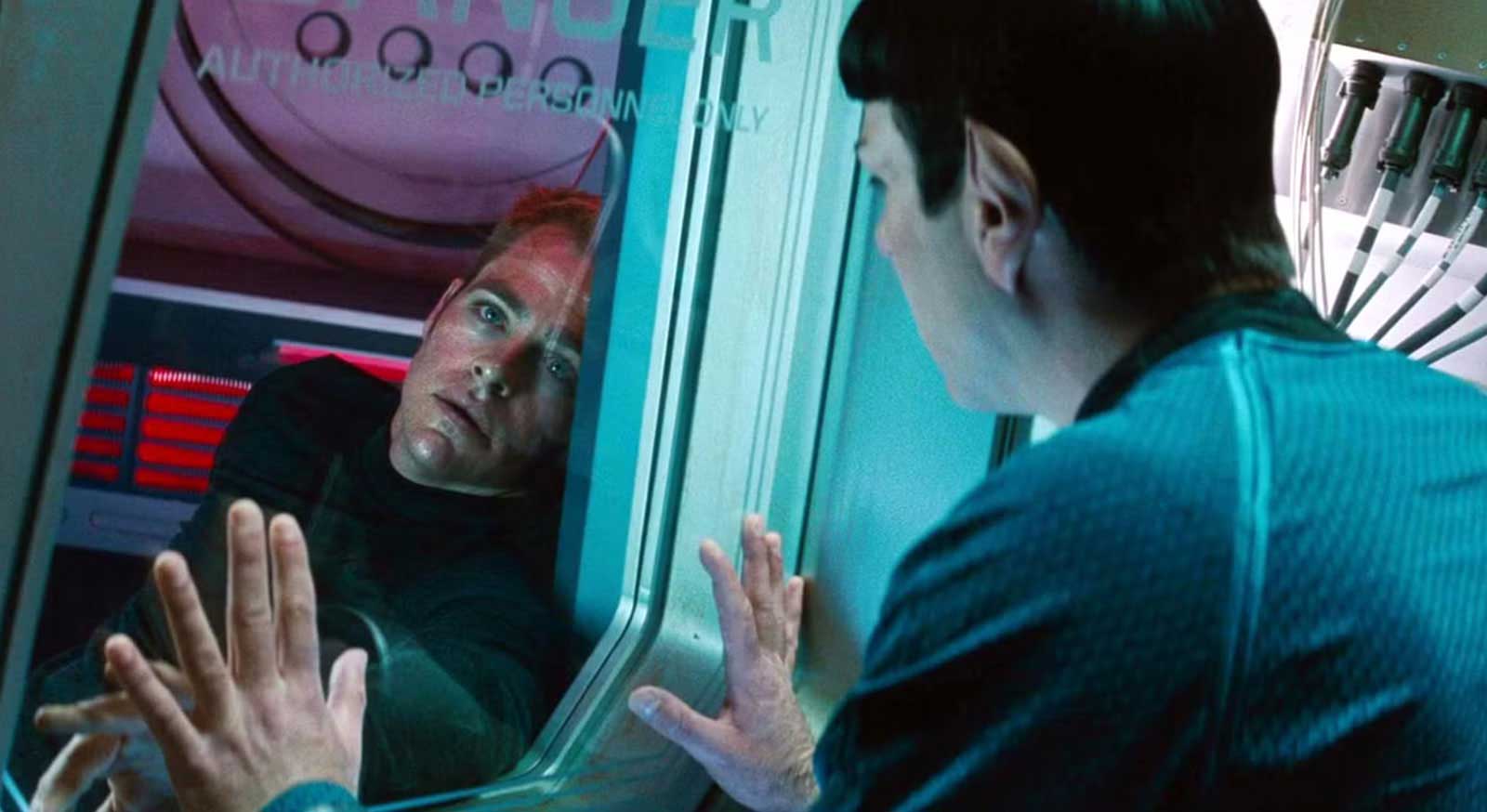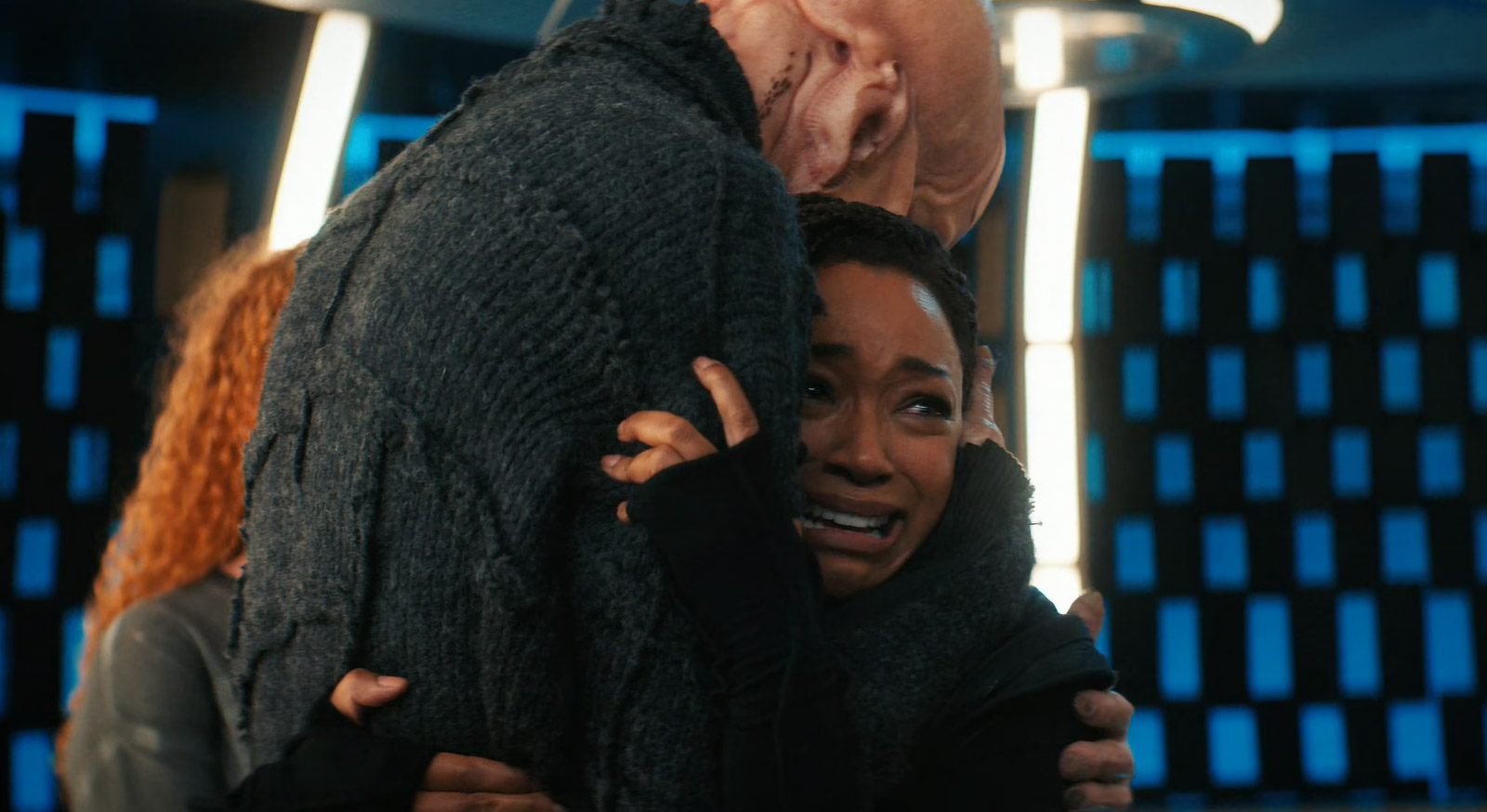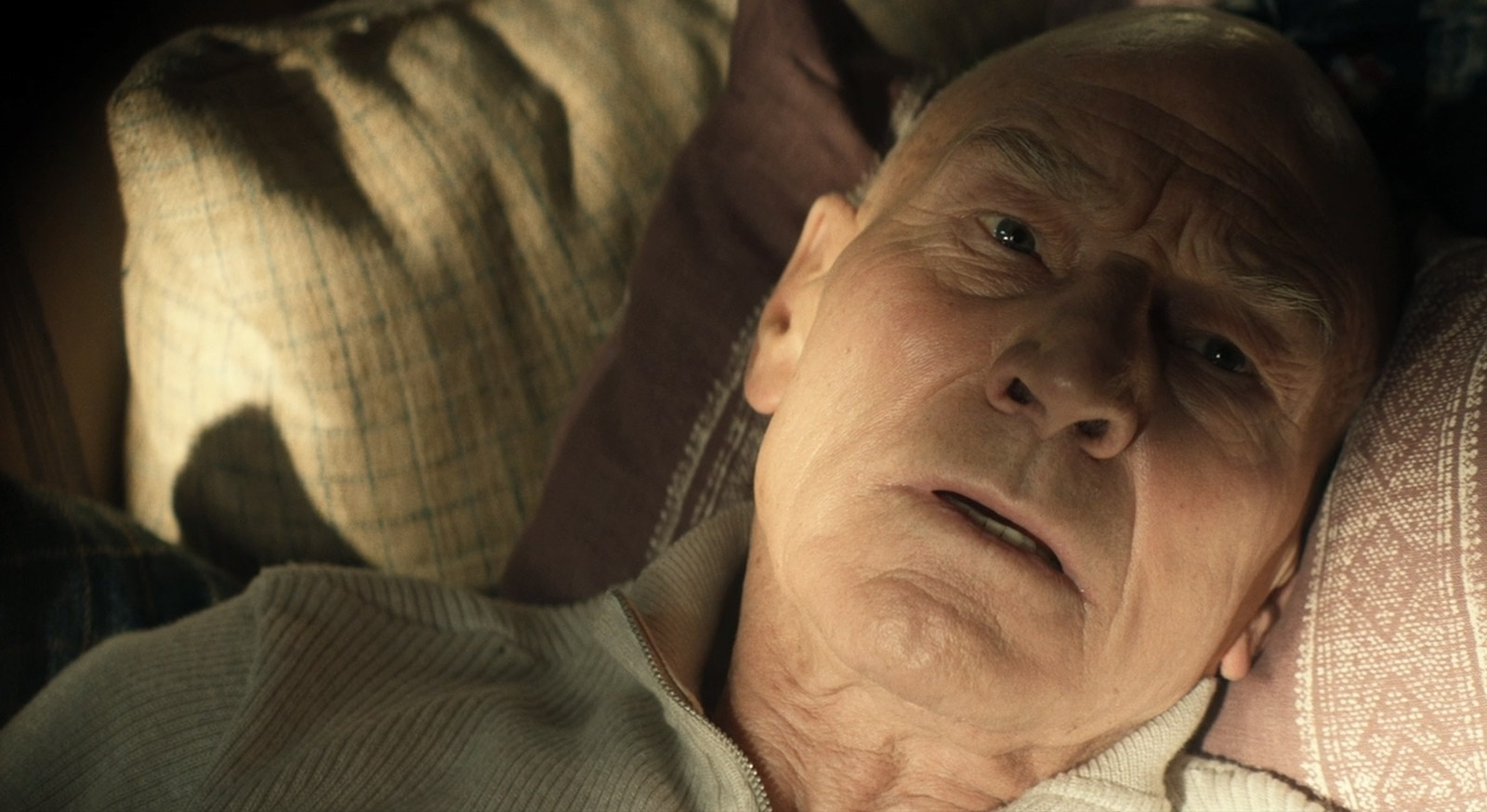J.J. Abrams Killed the Star Trek Franchise
 By Marcus Caughcus
By Marcus Caughcus- 09.08.2021
-
Share on XShare a link to this article on your X feed.
-
Share on FacebookShare a link to this article on your Facebook feed.
-
Send to a Friend or EnemySend a link to this article to a friend or enemy via your e-mail client.
-
Share LinkCopy a link to this article to your clipboard.
- Jump to CommentsView the comments for this article.
Once Boldly Going
Fifty-five years ago today, Star Trek debuted its first voyage of the Starship Enterprise, setting the stage for a science fiction saga that dared to explore not only uncharted territories of the galaxy, but morality, ethics, politics, and philosophy. Despite the modest sets, the goofy makeup, and the actors hamming it up, Star Trek built its legacy on character-driven stories. Each episode followed a diverse cast working together to resolve the toughest predicaments within a television hour. It was an adventure meant to inspire ideas, spark curiosity, and reflect on our place in the universe.
The series, along with its many spin-offs, delivered thrilling adventures from temporal distortions of the space-time continuum to encounters with aliens who always spoke perfect English, taking place in a future where advanced technology miraculously fixed everything just before the next episode. It was done with the incredible self-control and professionalism of a crew always at the risk of being instantly vaporized onboard a ship that could suffer a containment field collapse causing a warp core breach.
At its heart, Star Trek wasn't just about seeking out new life and new civilizations; it pursued truths from within its characters. It revealed strengths, acknowledged weaknesses, and showed growth by learning from mistakes. The series wove allegories that championed the idea humanity is always greater than the sum of its parts. It was Gene Roddenberry's hopeful vision of a future where, regardless our differences and in spite of our sins, cultures could unite for a common goal.
This vision is what made Star Trek an enduring and uplifting journey, no matter how bleak things in the real world seemed to be. Whether the Enterprise was investigating a mysterious anomaly, aiding colonists through an environmental crisis, or rerouting power to the shields, the crew always faced their mission with unwavering confidence. They stood tall and resolute, determined to succeed, no matter the odds. From the patient finesse of diplomacy to the chaos of phasers and photon torpedoes, every station contributed with integrity and honor, striving always to give nothing less than their best.
Sadly, this Star Trek doesn't exist anymore.

William Shatner, DeForest Kelley, and Leonard Nimoy in Star Trek (1968)
ViacomCBS
The Kelvin Timeline
When J.J. Abrams and his production studio Bad Robot were given the reigns of Star Trek, the franchise was rebooted to transplant James T. Kirk and the U.S.S. Enterprise into an alternate timeline. This clever move freed the original crew to embark on new adventures without being bound by decades of canon.
While this idea was conceived to breathe new life into a series over a half-century-old, the premise was never put to good use. It set a troubling precedent by destroying Spock's home world, severely undermining one of the franchise's most beloved characters. It poorly rehashed Star Trek II: The Wrath of Khan's battles of wit and intellect with one-dimensional antagonists at the helm of cartoonish action sequences. Its final act pitted the crew against an alien who challenged the Federation's ideals of peace and unity, only to reveal he was a bitter Starfleet marine.
These movies made little effort to create anything original, merely rearranging elements and subplots from existing stories. While this certainly wasn't unfamiliar territory for the various series within the franchise, it never truly justified the rationale for an alternate timeline to begin with.

Chris Pine and Zachary Quinto in Star Trek Into Darkness (2013)
ViacomCBS
Likewise, the failure to fully commit to this new universe became a detriment to its characters, leaving most of them disappointingly mundane. Their identities required an association from the original show which the reboot so desperately tried to sidestep, lacking any meaningful inspiration of their own. Instead, they drifted through the narrative as pale imitations, absent of the depth and charm that once defined the series' iconic crew.
The lack of imagination also retcons the technical principles that make Star Trek tick. Cadets are instantly fast-tracked to command positions, skipping a career altogether. The Enterprise is foolishly constructed on the surface of Earth. Turbolifts zoom like rollercoasters as they careen through empty volumes of space inside the ship. And Into Darkness unveiled backpack-sized transporter technology that can send individuals across the galaxy to distant worlds, rendering starships obsolete and pointless.
This creative bankruptcy is the hallmark of Bad Robot productions, spitting out the what first and figuring out the why later, if at all. It is a process in which the only established lore are characters victimized by significance they never earned. Not only has this become the underlying failure of Star Trek, but the collapse of Star Wars as well.
Star Trek: Girl Power
Star Trek: Discovery, one of many Star Trek television series in the hands of Bad Robot producer Alex Kurtzman, continues this failed tradition. Set a decade before the original series, the show centers on Commander Michael Burnham, a badly conceived attempt at an anti-hero who is contemptible from the very beginning. She quickly turns mutineer, driven by her conviction that she is smarter than everyone else aboard her ship.
Although she is punished for her actions, it's short-lived and she's quickly absolved of her crimes. As the series progresses, everything inevitably hinges upon her, regardless of the mission, its stakes, or the combined experience of an entire starship crew. Her incredible talents are forged in the flames of annihilating Star Trek canon, most notably through the revelation that she is the foster sister of Spock. However, the writers of Discovery don't invest in this idea, but instead remanufacture all of Spock's choices, passions, and experiences based on his silent admiration for her.
There is no point to anything else in the show because she is the linchpin for every episode, the guiding force of Star Trek now, both in story and in marketing, and the rest of its universe must submit to her greatness.

Sonequa Martin-Green in Star Trek: Discovery (2017)
ViacomCBS
It is this prostitution of Star Trek that has liquidated a franchise of its reputation. Characters are endorsed for what they are instead of who they are, low-ranking officers talk back and challenge their superiors with no consequence, and those who aren't women, aren't of color, or aren't gay are often patronized and treated like children.
Plot holes gather and loom over each episode as most story elements are not fully realized or written with purpose. The show is largely female with men considered weak and ineffectual because Kurtzman and company admit they have difficulty writing them. Accomplishments aren't expressed with composed triumph, but are instead scenes of grown adults weeping and crying. The future is depressing and hopeless.
There is simply no joy in the journey, no ideas to explore, and no real adventure to be had.
Tears of Picard
This is equally prevalent in Star Trek: Picard, another broken feather in the cap of Alex Kurtzman who admits that Star Trek is now a platform to push agendas instead of telling stories. The once revered and respected Jean-Luc Picard, a man with an incredibly distinguished career, is reduced to a withering dotard who literally complains about having lost the will to live. He's sidelined for the entirety of the show in favor of a young woman with no past to explore by nature of her later revealed three-year-old artificial existence.
Converse to the well-established future utopia of Earth, the show delves into dark and unsettling territory by inexplicably condoning murder, issuing contrived grievances of a poor black lesbian in a trailer grappling with addiction, and a United Federation of Planets that never once turned a blind eye to those in need suddenly becoming hateful and racist.

Patrick Stewart in Star Trek: Picard (2020)
ViacomCBS
Picard immediately becomes a casualty in his own story, his legendary command of the Stargazer and two Enterprises ignored by his former superiors. He's constantly shouted at, talked down to, insulted, humiliated, and utterly disrespected at every turn. His insight and experience are sacrificed at the expense of cardboard characters with no redeeming value. He is merely used as a tool in a series bereft of any sense or direction, squandering opportunities to capitalize on his presence.
It's a show that demands the excitement and popularity of Star Trek: The Next Generation, but makes absolutely no effort to work for.
The Final Frontier
Star Trek has always been a reflection of current events and politics, but it now expresses these things through the shards of a broken mirror. It challenges social issues that are manufactured instead of real, alienates once ardent fans who respected its optimistic message of hope for the future, and no longer encourages different perspectives to collaborate. To make things worse, famous Star Trek actors are no exception to Hollywood elites exposing their perceptions of the world on social media, reinforcing the adage, "never meet your heroes."
Patrick Stewart claimed in an interview the United States was a "fucked state" under President Trump, Marina Sirtis condemned and blamed Texans for power outages that seized the state earlier this year in a series of angry Twitter rants, and George Takei has become a strong proponent of the same government mandates responsible for his lived experience in an internment camp as a child. Even the official Star Trek site published an article from a fan supporting communism, an ideology the franchise and its creator were always strongly against and fought to contest in dozens of episodes.
Like so many cherished entertainment franchises, Star Trek has lowered the bar for people unaware of how the world works and the struggles figures of history endured to help shape it. There is no wisdom to share because the writers haven't any of their own, no nuanced characters fans can relate to as they're ignorant of the complexities and tenors that define real people.
Ultimately, it is the complete absence of respect for Star Trek by J.J. Abrams, Alex Kurtzman, and Bad Robot that has resulted in the franchise's diminishing returns. Despite the immense advantages of streaming services, larger budgets, and advanced tools to bring its imaginative universe to life, Star Trek no longer holds the cultural presence it once had. Its ending is inevitable, a painful demise unfolding in slow motion. It must rest until a new crew, one with genuine talent, meaningful experience, and a true representation of its soul, can take command again.
Comments
Give us your hot take on this hard-hitting piece by joining Mental Discharge.
In case you weren't sure that star trek is dead just watch the musical episode. Ugh.
star trek has always been gay, thats why SW dominated





